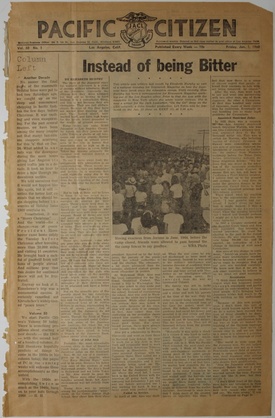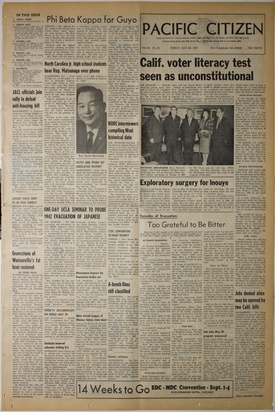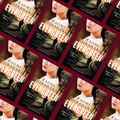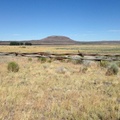It is February 2022, and the 80th anniversary of the signing of Executive Order 9066 has just passed with a groundswell of events commemorating a National Japanese American Day of Remembrance. I am grateful to have participated in a few, and proud of the Japanese American community for all of its efforts to keep camp history alive. I live in the wake of remembrance and resistance and resilience, and I am grateful for all of these.
As a Sansei daughter, niece, granddaughter of Japanese American incarcerees, I have been thinking very hard about some lines from my Nisei dad’s unpublished camp memoir, Daruma: The Indomitable Spirit. They appear towards the end, where my 14-year old dad is facing separation again from his father, Junichi Nimura. Due to my grandfather’s arrest and fiery speech making at Tule Lake, he was arrested from within Tule Lake, sent to Klamath Falls jail, then to detention facilities in California and New Mexico, before being returned to my dad and the rest of his family. These activities also meant that he was not allowed to leave camp with the rest of his family. My oldest auntie and uncle had already left camp, so my dad was in charge of the family as the next oldest sibling. They left my grandfather behind in camp, and despite all of my father’s efforts to bury his emotions, he burst into gut-wrenching sobs.
“I felt bitter then,” he wrote, some time before I was born in the early 1970s. “I didn’t know where to direct my bitterness.”
Out of a several hundred page manuscript, these lines mark one of the few places in the book where my dad talks about his emotional life. Because he died when I was ten, I can’t ask him more about how he was feeling in camp, or after camp. I have come to realize that this absence means that I need to listen harder to the places where he does talk about his emotions.
* * * * *
1.
Do other Nisei talk about bitterness?
Here is a constellation of excerpts from discussions of bitterness in the Densho interviews.
August 18, 1997
Frank Yamasaki: “You know, people say, ‘Bitter’?” Yes, I’m bitter. I’m still bitter. It’s wrong. And the thing I’m bitter is, if the country can’t learn from the wrong theydone, then that kind of thing is still continuing. That’s what I’m angry about.”
April 9, 1998
Dee Goto: “I was bitter, I was a bitter person for a long, long time. Not only the war I was forced to go into camp.”
January 24, 2008
Art Abe, in conversation with Tom Ikeda
Tom Ikeda: “So you mentioned Puyallup, so eventually you and your family were moved to Puyallup, the Puyallup Assembly Center. What was that like for you and your family?”
Art Abe: “Well, I guess I was pretty bitter at that time….”
Tom Ikeda: “What were you bitter about? Think back to that time…”
Art Abe: “The fact, the fact that I wasn’t accused of anything, and I felt that the writ of habeas corpus was suspended. I couldn’t believe what the government was doing to us.”
July 31, 2008
Norman I. Hirose, in conversation with Tom Ikeda
Tom Ikeda: “And so where do you think this philosophy of not being bitter came from?”
Norm Hirose: “To be bitter is not useful. Being revengeful, or whatever you want to call it just what good is it?”
Tom Ikeda: “And so where did you learn this?”
Norm Hirose: “I don’t know. I don’t know where I learned that, but I must have. But to be bitter, you see it sometimes and you ask, ‘well, what good is it?’ And then of course it’s no good.”
April 7, 2011
K. Morgan Yamanaka, in conversation with Tom Ikeda and Barbara Takei
Tom Ikeda: “But, so people sometimes ask me about the Niseis, and again, it seems extraordinary to them that there’s not this huge sense of bitterness…that would kind of drag them down.”
Morgan Yamanaka: “Well, I could say it’s my personality. Many people say, ‘You’re a no-no? Aren’t you bitter?’ Well, the question of bitterness never entered my life.”
2.
Now that I know more about camp history and camp literature, I am surprised that my dad was able to write about bitterness at all. He was writing about bitterness in the 1960s and early 1970s, before the Redress Campaign, and before a public groundswell of Nisei telling their stories. During decades of collective silence in the history books, in classrooms, at Japanese American gatherings and events.
As a Sansei, I am overly used to hearing about Japanese American bitterness—or perhaps more importantly, a lack of bitterness. I am used to hearing about how a lack of bitterness is praiseworthy. This lack of bitterness, or lack of anger, and the corresponding praise for that silence, is something I want to examine. I want more frames, or a more expansive landscape, to think about bitterness.
3.
I am thinking about my 2017 conversation with the Yonsei poet Brandon Shimoda, which creates space to think about Japanese American anger and Japanese American bitterness. I began this conversation with Brandon after reading “Portland Historical Plaza,” a fantastic musing about the Japanese American memorial in Portland, Oregon.
In his essay, Brandon wonders about who is named at the Portland Historical Plaza, and who is not. In a provocative passage, he wonders,“ What about the Japanese Americans who did not make American military history? What about the Japanese Americans who did not make invaluable contributions to national life? What about the Japanese Americans who did—nothing?”
Later in the essay, Brandon refers to the poets—who are unnamed at the memorial itself, and notes that “The poems, meanwhile, express sentiments in which emotion has been muted, if not erased.”
Because of Brandon’s essay, and my conversation with him, I am thinking about people that are erased, about emotions that are being silenced. In that space there is a voice that says to me, What about those who were bitter about camp?
4.
Inspired by the enormous and rich indexing work done by Hana and Noah Maruyama in their Densho podcast, Campu, I decided to look through the Densho archives for when and where the words “bitterness” or “bitter” appear. The results surprised me. An early pattern of praising Japanese Americans for not being bitter appears fairly early.
Two excerpts from the Pacific Citizen, newspaper of the Japanese American Citizens League—both by (presumably) White writers.

There are multiple ways that Japanese Americans coped with the aftermath of their mass incarceration. One appears on the January 1, 1960 edition of the Pacific Citizen, “Instead of Being Bitter,” by Elizabeth Murphy. Whether intentionally or not, Murphy planted the seeds for the 1966 “Success Story.” Notes about the first writer say that she was writing as part of a series for Newsweek. Articles like Murphy’s are frequently credited with codifying the Model Minority Myth, subsequently pitting Japanese Americans against African Americans and much of the Civil Rights Movement.
“The story of the Japanese since the wartime relocation is a story of success without bitterness,” she writes. “Most of the Japanese, especially the citizens, feel that they were wronged but they are so lacking in hard feelings it is a remarkable thing, and this is not because they are obsequious. They are just philosophical. Because of this they have not wasted time dwelling on the past. They have looked ahead, have worked hard, and have high hopes for the future, hopes grounded in the reality of present successes.”
“But to look at them and listen to them is to see proud happy people, not people dissipating their energies or pointing out their scars.”

Years later—one year after sociologist William Petersen published “Success Story, Japanese American Style”, in some of the peak years of the Civil Rights movement—-the discourse had deepened its commitment against bitterness. On May 26, 1967, the headline became “Too Grateful to Be Bitter,” the article by another Newsweek writer, Edwin McDowell. McDowell concludes,
“All four, it goes without saying, are loyal citizens. They are too proud of what they overcame and too grateful for what they have to look back in anger or bitterness.”
5.
I do not have enough vocabulary, enough words, to talk about bitterness, about how bitterness is different from (or worse than) anger.
I start to ask around. My friend Sara Protasi is a philosopher of emotion, and she sends me a 2021 article by professors Anna Cremaldi and Jack M.C. Kwong titled “Bitterness Without Hope,” which traces the lineage of our modern images of bitterness all the way back to Aristotle. The bitter person, the authors write, is usually someone who has “swallowed and improperly digested anger.” Bitterness, they say, is “a subterranean emotion.” The bitter person is “someone who seems to feed unhealthily on a private sense of injustice, occasionally and awkwardly expectorating their undigested anger.”
Bitterness, then, is the anger someone is forced not only to swallow, but to carry around with them in perpetuity. Talking about the African American writer James Baldwin, and his essay “Notes of a Native Son,” the authors elaborate: “Now has to carry his own anger. It feels to him as if he has to go forward with a burden and do so with an acrid taste in his mouth.”
6.
What can we gain when we talk about bitterness? Who and what can we hear? What about those who died before redress, who didn’t get to tell their story, like my dad? The opportunity to speak about anger is another great gift that the Redress Movement gave the community, an alchemy transforming bitterness into anger that people could digest.
Who do we silence or erase when we don’t talk about bitterness?
7.
This, in part, might be what my father meant when he said that his bitterness had no direction, and no expression. When he wrote about bitterness, the very act of writing might have been his way of directing it somewhere, at least.
This might be what my uncle Hiroshi Kashiwagi was thinking about when he wanted to name one of his sons James, after James Baldwin. I am now looking at a paperback copy of Baldwin’s essays on my bookshelf, the copy that I inherited from my Uncle Hiroshi before he passed away in 2019.
This might also be what my uncle meant when he testified before the CWRIC in 1981. He concluded, “Members of the Commission, if you represent America, take this burden of guilt. It’s no longer mine….Unburden yourself, America.”
© 2022 Tamiko Nimura





